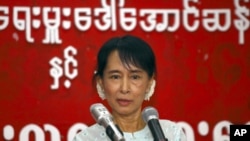Nobel Laureate and pro-democracy advocate Aung San Suu Kyi says the people of Burma are closely following events in the Middle East, where largely peaceful protests have forced governments out of office in Tunisia and Egypt.
Aung San Suu Kyi says Burma’s military government has attempted to block coverage of events in the Middle East from reaching ordinary people without much success. She spoke to foreign correspondents in Kuala Lumpur through an audio link from Rangoon.
The 65-year-old Nobel Laureate said the ousting of governments in Tunisia and Egypt - as well as the confrontation between supporters of Libyan leader Moammar Gadhafi and anti-government protestors - were followed closely by the Burmese people.
"They are comparing what’s happening there with what happened in Burma [in] 1988 and one of the things they have noticed is that in Tunisia and in Egypt the army did not fire on its people, whereas in Libya it is different," she said. "The outcome also seems to be much more complicated and much worse in Libya than in Tunisia and Egypt. Everybody is waiting around to see with great interest what transpires because people were impressed with
what happened, particularly in Egypt."
As leader of the National League for Democracy, Aung San Suu Kyi won democratic elections in 1988 but the result was rejected by the military, which put down protests and has ruled the country ever since.
Aung San Suu Kyi spent most of the last two decades behind bars or under house arrest before she was freed last November, after scheduled elections, widely regarded as a sham by international rights groups and others.
Under military rule, civilian frustrations have erupted into protests on the streets of the capital, Rangoon, most recently in 2007 when thousands of Buddhist monks demonstrated. They were beaten harshly, fired upon by the military and jailed.
Aung San Suu Kyi says this is the significant difference between the plight of Burmese people and those living under totalitarian or autocratic regimes in the Middle East.
"Well the people have stood in Burma before as you know and in those instances they were fired upon by the army and I think that makes a great difference. Now the situation in Libya is that the army itself appears divided in regard to how the situation should be handled. In
Burma I don’t think there was any noticeable divisions with regards to the policies of the military," she said.
Aung San Suu Kyi says even Burma can not escape 21st Century technology that has significantly increased the ability of people to organize without interference by their governments and she says she intends to sign up for Facebook and Twitter as soon as possible.
There are also plans to expand her party’s network among Burmese people living abroad to bring pressure on the Burmese military and the government, which she hopes might encourage them to the negotiating table and towards national reconciliation.




